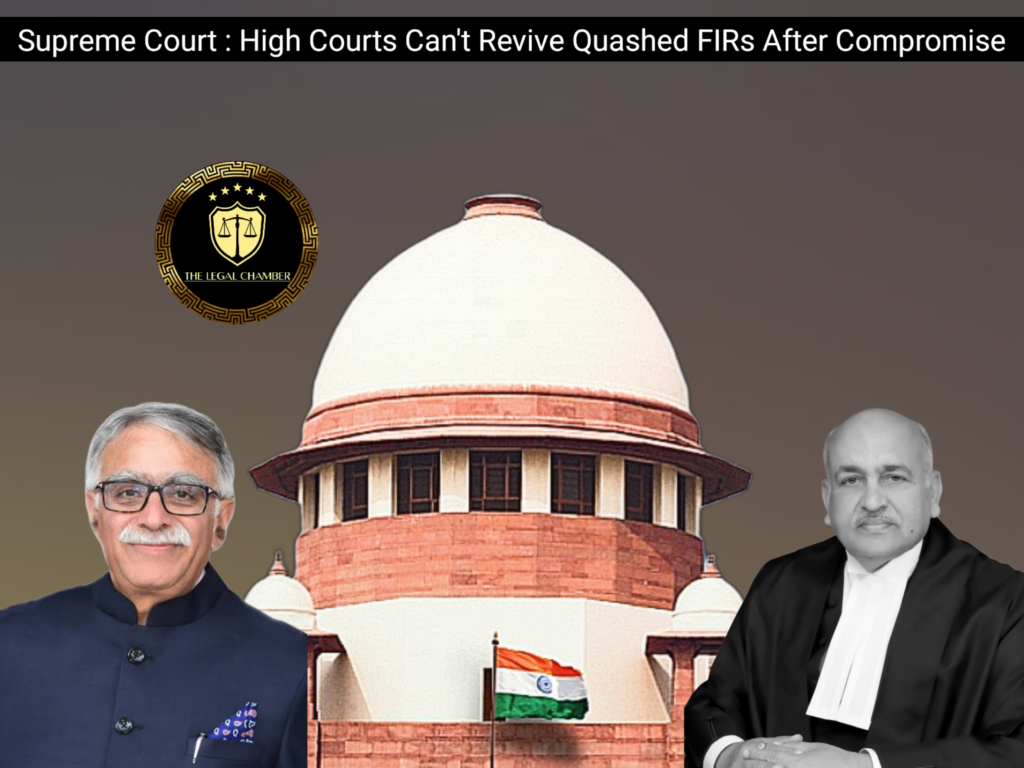
The Supreme Court ruled that High Courts cannot revive quashed FIRs under Section 482 CrPC after parties have reached a lawful compromise, emphasizing the absolute bar under Section 362 CrPC against reviewing judgments except for clerical errors. It clarified that inherent powers cannot override statutory prohibitions, allowing recall only in cases of jurisdictional errors or abuse of process. The judgment reaffirmed that violation of compromise terms must be addressed through civil remedies, not criminal proceedings. The Court directed all High Courts to adhere to this settled legal position.
Facts Of The Case:
The case originated from a property dispute in Haryana, where an FIR (No. 432/2014) was registered under Sections 406 and 420 IPC against Raghunath Sharma and others for alleged cheating and breach of trust regarding multiple sale agreements between 2013-2015. The parties subsequently entered into a compromise deed on July 14, 2015, leading the Punjab & Haryana High Court to quash the FIR on March 21, 2016, under Section 482 CrPC after verifying the settlement’s voluntariness. However, the complainant later filed applications in 2016 and 2018 seeking revival of the FIR, alleging violation of compromise terms. The High Court allowed the revival through its October 8, 2018 order, which was challenged before the Supreme Court. The apex court examined whether the High Court could exercise its inherent powers under Section 482 CrPC to recall its earlier quashing order after the parties had settled the dispute. The judgment centered on interpreting the scope of Sections 362 (bar on judgment alteration) and 482 (inherent powers) of CrPC, with the Supreme Court ultimately holding that the High Court’s revival of proceedings amounted to an impermissible review of its final judgment.
Procedural History:
The case began with the registration of FIR No. 432/2014 at Gurgaon Police Station under Sections 406/420 IPC regarding a property dispute. The Punjab & Haryana High Court initially quashed the FIR on 21.03.2016 under Section 482 CrPC based on a compromise deed dated 14.07.2015. Subsequently, the complainant filed multiple applications (10.09.2016 and 27.03.2018) seeking revival of proceedings, which were initially rejected but later allowed by the High Court’s impugned order dated 08.10.2018. The appellants then approached the Supreme Court through SLP(Crl) Nos. 8101-8102/2019, challenging the High Court’s jurisdiction to review its own quashment order. The Supreme Court, in its judgment dated 16.05.2025, allowed the appeals and set aside the High Court’s revival order, holding that Section 362 CrPC’s bar on judgment alteration prevails over Section 482’s inherent powers except in exceptional circumstances like jurisdictional errors. The Court clarified that breach of compromise terms must be addressed through civil remedies, not criminal proceedings.
READ ALSO : Supreme Court Denies Anticipatory Bail in Andhra Liquor Scam Case
Court Observation:
The Supreme Court made several critical observations in its judgment. It emphasized that Section 362 CrPC imposes an absolute bar against altering or reviewing judgments except for correcting clerical errors, noting this restriction applies equally to the High Court’s inherent powers under Section 482 CrPC. The Court clarified that inherent jurisdiction cannot be exercised to circumvent statutory prohibitions, observing that “the power of recall is different from the power of altering/reviewing the judgment.” It identified only two narrow exceptions where recall may be permitted: (1) violation of natural justice principles (audi alteram partem), or (2) abuse of process affecting the court’s jurisdiction. Significantly, the Bench held that alleged violations of compromise terms constitute civil disputes that cannot revive quashed criminal proceedings, stating such matters must be addressed through appropriate civil remedies. The judgment underscored that courts become functus officio after final disposal of cases, and any attempt to review merits would undermine judicial finality. These observations reaffirmed the limited scope of post-judgment interventions while protecting the sanctity of compromise-based resolutions in criminal matters.
Final Decision & Judgement:
The Supreme Court, in its final judgment dated May 16, 2025, allowed the criminal appeals and set aside the Punjab & Haryana High Court’s orders dated October 8, 2018 and April 29, 2019 that had revived the quashed FIR. The Bench comprising Justices Pankaj Mithal and Sanjay Karol held that the High Court’s recall of its earlier quashment order was legally impermissible under Section 362 CrPC, which bars review of judgments except for clerical corrections. The Court ruled that inherent powers under Section 482 CrPC cannot be invoked to circumvent this statutory prohibition, except in two exceptional circumstances: (1) violation of natural justice principles, or (2) abuse of process affecting jurisdiction – neither of which applied in the present case. The judgment clarified that alleged breaches of compromise terms must be addressed through civil remedies rather than reopening quashed criminal proceedings. The Supreme Court directed its ruling to be circulated to all High Courts as binding precedent on the limited scope of post-judgment interventions under Sections 362 and 482 CrPC. All connected matters were disposed of accordingly, restoring the legal sanctity of the original compromise-based quashment.
Case Details:
Case Title:Raghunath Sharma & Ors. vs. State of Haryana & Anr. Citation:2025 INSC 723 Appeal No.:(Arising out of SLP(Crl.) Nos. 8101-8102 of 2019) With Connected Matter Date of Judgment:May 16, 2025 Judges/Justice Name:Justice Pankaj Mithal & Justice Sanjay Karol
Download The Judgement Here